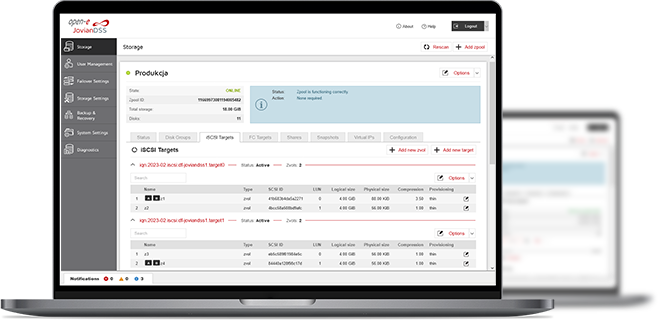Open-E JovianDSS is a VMware-ready storage solution that utilizes iSCSI, FC, and NFS (for NAS) protocols for hosting hundreds of virtual machines on optimal data storage space. It gives you a cost-effective, flexible, and scalable data storage solution for virtual environments that offers high availability, high performance, and high data efficiency.
Open-E JovianDSS is a data storage software that includes On- & Off-site Data Protection and the optional High Availability cluster feature, and can be implemented as a stand-alone data storage server or as Virtual Storage Appliance.
You can install Open-E JovianDSS as a data storage for ESXi within minutes and connect it in a few steps only, since its intuitive WebGUI simplifies storage administration. You will also get the professional technical support for the complete storage setup including VMware implementation in case of any doubts.
80%
of Open-E customers use our software for virtualization with VMware
40k+
Open-E software installations in 100+ countries to date
400+
Reseller and MSP partners worldwide
Open-E JovianDSS enables:
- consistent backup of Virtual Machines and user data, including databases and provides advanced schedules and retention plans – lowering RPO (Recovery Point Objective),
- quiesced snapshots feature, that allows a virtual machine data to be in a more consistent state for the snapshot purposes, and protect the environment against the ranso-mware effects,
- offload operations support for iSCSI and Fiber Channel with VMware vStorage APIs for Array Integration (VAAI),
- support for Single-Root Input/Output Virtualization (SR-IOV) that enables sharing of the network card to many virtual machines at the level of direct access to the hardware (coming in Up30 version).
Cost-Effective Data Storage for Virtualized Infrastructure
Open-E JovianDSS comes with inexpensive product licenses and technical support options, compared to other storage software providers:
- The licensing system is based on the capacity of each storage environment, and designed to be as fair as possible for users.
- Lowers Total Cost of Ownership (TCO) through built-in storage virtualization with thin / over provisioning and compression.
- Free, built-in backup feature, no third party software necessary

Open-E JovianDSS: VMware Ready™ Data Storage
Open-E JovianDSS is VMware Certified Storage for iSCSi, Fibre Channel and NFS (for NAS) . It was tested and optimized to work effectively with VMware infrastructures.
- Storage Certification for VMware vSphere® 5.5, 6.0, 6.5, 6.7 and 7.0
- Advanced solutions with vSphere integrated and validated, including disaster recovery, multipathing, offload capabilities, High Availability clustering and storage management
Want to Learn More?

3-in-1 Complete Data Storage Solution
Accelerate Your Data Storage with ZFS-based Storage System

Live Demos with Open-E Engineers
- Several free online meetings - each discussing a different Open-E JovianDSS functionality.
- Chance to ask questions while and after the presentation.
- Opportunity to understand how Open-E JovianDSS works without any installation or setup.

Find the Exact License for Your Storage Setup
This calculator helps you to find the exact license required for your storage setup with Open-E JovianDSS, based on your individual specification.
Enter the configuration of your choice into the calculator and generate a PDF report.
Open-E Library